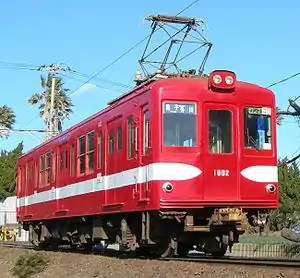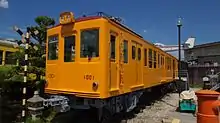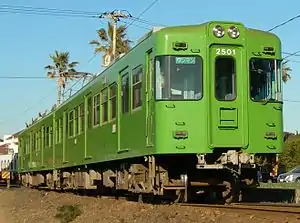Choshi Electric Railway 1000 series
The Choshi Electric Railway 1000 series (銚子電鉄1000形, Chōshi Dentetsu 1000-gata) is an electric multiple unit (EMU) train type formerly operated by the private railway operator Choshi Electric Railway in Chiba Prefecture, Japan, from 1994 until 2016. The type originally consisted of two single cars, DeHa 1001 and DeHa 1002, converted from former TRTA (now Tokyo Metro) subway 2000 series EMU cars, originally built in 1959 and 1960, and introduced from 29 August 1994 to replace the ageing 100 and 500 series EMU cars.[1][2] Car 1002 was withdrawn in February 2015, and car 1001 was withdrawn in February 2016.
| Choshi Electric Railway 1000 series | |
|---|---|
 DeHa 1002 in service in January 2012 | |
| In service | August 1994 – February 2016 |
| Manufacturer | Hitachi, Teikoku Sharyo |
| Replaced | 100/500 series |
| Constructed | 1959–1960 |
| Refurbished | 1994 |
| Number built | 2 vehicles |
| Number in service | None |
| Number preserved | 1 vehicle |
| Formation | Single car |
| Fleet numbers | DeHa 1001/1002 |
| Capacity | 98 (34 seated) |
| Operator(s) | Choshi Electric Railway |
| Depot(s) | Nakanochō |
| Specifications | |
| Car body construction | Steel |
| Car length | 16,000 mm (52 ft 6 in) |
| Width | 2,700 mm (8 ft 10 in) |
| Height | 4,100 mm (13 ft 5 in) |
| Doors | 3 pairs per side |
| Weight | 30.5 t |
| Traction system | MB-3054-AE4 (75 kW x4) |
| Power output | 300 kW |
| Electric system(s) | 600 V DC overhead wire |
| Current collection method | PT44A pantograph (x1) |
| Bogies | Sumitomo FS-316 |
| Track gauge | 1,067 mm (3 ft 6 in) |
Build details
DeHa 1001 was built in November 1960 by Teikoku Sharyo as car 2046 for the TRTA Ginza Line subway (present-day Tokyo Metro Ginza Line) in Tokyo. DeHa 1002 was built in November 1959 by Hitachi as car 2040 for the Honancho Branch of the TRTA Marunouchi Line subway (present-day Tokyo Metro Marunouchi Line) in Tokyo.[3]
| No. | Former No. | Manufacturer | Build date |
|---|---|---|---|
| DeHa 1001 | 2046 | Teikoku Sharyo | November 1960 |
| DeHa 1002 | 2040 | Hitachi | November 1959 |
Conversion work for use on the Choshi Electric Railway involved the addition of second driving cabs (reclaimed from TRTA 2033 for 2046, and from 2039 for 2040) by the Keio Group train maintenance and refurbishment company Keio Juuki Seibi (京王重機整備). The original 1,435 mm (4 ft 8 1⁄2 in) standard gauge bogies were replaced with narrow-gauge (1,067 mm (3 ft 6 in)) Sumitomo FS-316 bogies from withdrawn Fuji Kyuko 5700 series EMU cars 5726 and 5725 (former Odakyu 2200 series 2227 and 2228). Pantographs from former TRTA 3000 series Hibiya Line EMUs were added to the former third-rail current collection cars, and the traction motors were also reclaimed from former 3000 series cars.[3]
 TRTA car 2046 in service on the Ginza Line in 1977
TRTA car 2046 in service on the Ginza Line in 1977 Sumitomo FS-316 bogie on DeHa 1001, January 2010
Sumitomo FS-316 bogie on DeHa 1001, January 2010
External livery
Both cars were initially painted in the "new" Choshi Electric Railway livery of dark brown and red.
DeHa 1001
On 26 April 2007, DeHa 1001 was returned to service repainted into a sky blue promotional livery sponsored by game manufacturer Hudson Soft in connection with the 20th anniversary of the Momotaro Dentetsu game series in 2008.[4][5] DeHa 1001 made its last run in "Momotaro Dentetsu" livery on 15 May 2012 before undergoing overhaul and repainting.[5] On 11 August 2012, this unit was publicly unveiled in its all-over yellow livery formerly carried when it operated on the TRTA Ginza Line.[6] It was returned to revenue service in this livery on 16 August.[6] From January 2013, the original TRTA numbering (2046) was added to the Choshi-end of the car.[7] In February 2016, car 1001 received a red roof, more closely resembling the livery carried by the Ginza Line TRTA 2000 series trains.[8] The car was finally withdrawn following its last day in service on 28 February 2016.[9] In March 2016, it was transported by road to the Showa no Mori Museum in Matsudo, Chiba.[9]
 DeHa 1001 in original Choshi Dentetsu livery in May 2006
DeHa 1001 in original Choshi Dentetsu livery in May 2006 DeHa 1001 in "Momotaro Dentetsu" livery in March 2008
DeHa 1001 in "Momotaro Dentetsu" livery in March 2008 DeHa 1001 in "Ginza Line" livery in December 2012
DeHa 1001 in "Ginza Line" livery in December 2012
DeHa 1002
DeHa 1002 was repainted into a new orange and blue livery in 2007 designed by Tetsuko no Tabi writer Naoe Kikuchi, intended to evoke an image of the sun rising across the sea.[1] In 2011, DeHa 1002 was repainted into a new livery based on the former TRTA Marunouchi Line colour scheme of red with a white bodyside stripe. The train was returned to revenue service in this livery on 26 November 2011, one day earlier than originally scheduled.[10] From January 2013, the original TRTA numbering (2040) was added to the Choshi end of the car.[7] Unit 1002 was withdrawn from service following its final run on 10 February 2015.[11]
 DeHa 1002 in original Choshi Dentetsu livery in May 2005
DeHa 1002 in original Choshi Dentetsu livery in May 2005 DeHa 1002 in "Tetsuko no Tabi" livery in January 2011
DeHa 1002 in "Tetsuko no Tabi" livery in January 2011 DeHa 1002 in "Marunouchi Line" livery and original TRTA number 2040 in November 2013
DeHa 1002 in "Marunouchi Line" livery and original TRTA number 2040 in November 2013 DeHa 1002 stored at Nakonocho Depot in November 2017
DeHa 1002 stored at Nakonocho Depot in November 2017
Interior
The trains featured longitudinal seating, and were equipped with fare collection boxes at each end for wanman driver only operation. The trains did not have air-conditioning.
 Interior view of "Momotaro Dentetsu" themed DeHa 1001 in June 2009
Interior view of "Momotaro Dentetsu" themed DeHa 1001 in June 2009 Fare collection box in DeHa 1002 in March 2008
Fare collection box in DeHa 1002 in March 2008 Driving cab of DeHa 1002 in March 2007
Driving cab of DeHa 1002 in March 2007
Operations
The two units normally operated as single cars, but could be coupled and operated in multiple when two-car trains were required for increased capacity, such as when special events were held in the area.[12]
History
The two EMU cars were purchased from TRTA in 1994, and were modified for driver-only-operation and repainted at a cost of approximately 35 million yen per car.[13] They entered revenue service from 29 August 1994.[3]
DeHa 1001 was involved in a head-on collision with DeHa 701 north of Kasagami-Kurohae Station on 24 June 1995. The driving cab at the up (Choshi) end was badly damaged, and the car was sent to Keio Juuki Seibi for repairs.[3]
In November 2014, it was announced that car 1002 would be withdrawn from service in early January 2015.[14] The unit's final run in passenger service was on 10 January 2015, operating in multiple with sister unit 1001.[11] Car 1001 was withdrawn following its last day in service on 28 February 2016.[9]
Preservation

Car 1001 is preserved at the Showa no Mori Museum in Matsudo, Chiba.[9]
References
- Satō, Toshio (December 2009). 銚子電鉄の電車たちを訪ねて [Visiting the trains of the Chōshi Electric Railway]. Japan Railfan Magazine (in Japanese). Vol. 49 no. 584. Japan: Kōyūsha. pp. 92–96.
- 年鑑'95日本の鉄道 [Yearbook 1995: Japanese Railways]. Japan: Railway Journal. April 1995. p. 66.
- Shirato, Sadao (July 2011). 銚子電気鉄道(下) [Choshi Electric Railway Volume Two]. Japan: Neko Publishing Co., Ltd. p. 42/45. ISBN 978-4-7770-5310-0.
- 「桃太郎電鉄20周年記念車両 出発式」開催 ["Momotaro Dentetsu" 20th anniversary train departure ceremony]. IT Media Games (in Japanese). IT Media Inc. 26 April 2007. Retrieved 11 August 2010.
- デハ1001 桃太郎電鉄 ラッピング車両運行終了のおしらせ [End of operations of DeHa 1001 in "Momotaro Dentetsu" livery]. Choden Blog (in Japanese). Japan: Choshi Electric Railway. 16 May 2012. Retrieved 7 June 2012.
- 銚子電気鉄道 『デハ1001銀座線カラー復刻記念 デハ1001・デハ1002車両展示』開催 [Choshi Electric Railway stages event to commemorate DeHa 1001 repainting in Ginza Line colour scheme]. Tetsudō Daiya Jōhō Magazine. Vol. 41 no. 342. Japan: Kōtsū Shimbun. October 2012. p. 73.
- 銚子電鉄デハ1001・デハ1002,銚子方に営団時代の旧車番 [Original TRTA numbers added to Choshi Electric Railway DeHa 1001 and DeHa 1002]. Japan Railfan Magazine Online (in Japanese). Japan: Koyusha Co., Ltd. 9 January 2013. Retrieved 9 January 2013.
- 銚子電鉄デハ1001の塗装が変更される [Choshi Electric Railway DeHa 1001 livery modified]. Japan Railfan Magazine Online (in Japanese). Japan: Koyusha Co., Ltd. 12 February 2016. Retrieved 12 February 2016.
- Yoshimura, Tatsuya (July 2016). 3/24, 銚子電鉄デハ1001、陸送される [24 March: Choshi Electric Railway DeHa 1001 transported by road]. Japan Railfan Magazine (in Japanese). Vol. 56 no. 663. Japan: Koyusha Co., Ltd. p. 160.
- デハ1002が丸ノ内線リバイバルカラーに [DeHa 1002 repainted in Marunouchi revival colour scheme]. RM News (in Japanese). Japan: Neko Publishing. 28 November 2011. Retrieved 4 December 2011.
- 銚子電気鉄道「ありがとうデハ1002号」運転 ["Thank you 1002" service runs on Choshi Electric Railway]. Tetsudō Daiya Jōhō Magazine (in Japanese). Vol. 44 no. 371. Japan: Kōtsū Shimbun. March 2015. p. 79.
- 銚子電鉄で,デハ1001と1002が連結して運転される [DeHa 1001 and 1002 run coupled together on Choshi Electric Railway]. Japan Railfan Magazine Online (in Japanese). Japan: Koyusha Co., Ltd. 3 August 2014. Retrieved 4 August 2014.
- 銚子電鉄の電車たち vol.2 [The Trains of Choshi Electric Railway Vol. 2]. choshi-dentetsu.jp (in Japanese). Choshi Electric Railway. Archived from the original on 12 August 2010. Retrieved 11 August 2010.
- 丸ノ内線分岐線カラー デハ1002が2015年1月上旬引退致します。 [Marunouchi Line livery DeHa 1002 to be withdrawn in early January 2015]. Choden Blog (in Japanese). Japan: Choshi Electric Railway. 5 November 2014. Retrieved 9 December 2014.
External links
| Wikimedia Commons has media related to Choshi Dentetsu 1000 series. |
- Choshi Electric Railway rolling stock profiles (in Japanese)
